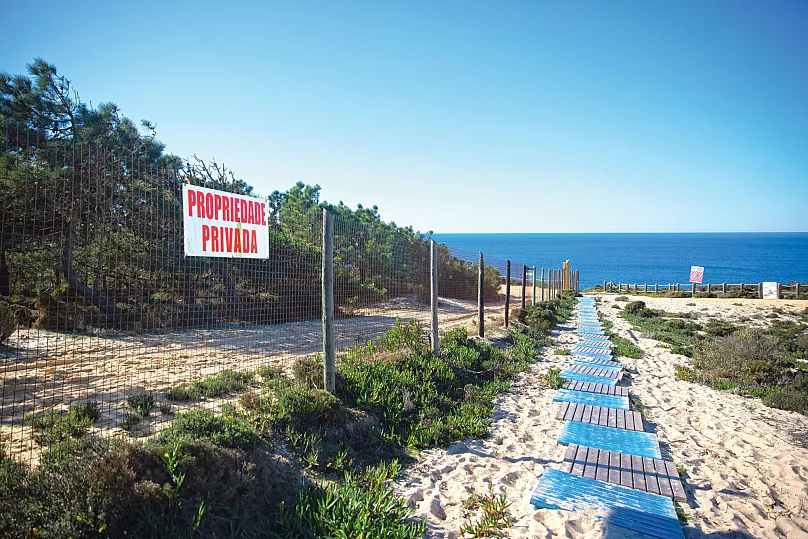Portugal to enforce beach access rules amid luxury resort development

Lisbon: Portugal has pledged stricter public access rules for a popular 45-kilometre stretch of its coastline amid concerns over rising housing prices and restricted beach access due to luxury resorts.
Portugal’s government and the Portuguese Environment Agency (APA) have pledged to tighten enforcement of public access rules along a popular 45-kilometre stretch of the coast, where rapid development of luxury resorts is fueling concerns over housing prices, restricted beach access and the loss of local identity.
Areas like Melides, Comporta and Troja have attracted global investors and wealthy tourists in recent years, transforming camping spots and fishing villages into high-end enclaves.
Residents and business owners say the shift has brought soaring costs and limited access to public spaces, particularly beaches where many grew up.
The APA inspected the 22 beaches along the 45-kilometre stretch of coastline and found that not all of them were public. Nine beaches along the coast had access limitations – two with controlled entry and seven restricted by private resorts.
Among them are Tróia-Galé and Galé-Fontainhas, where visitors must present identification or pass through private developments to reach the sand. In some cases, parking is scarce or far from the coast.
At Galé-Fontainhas, one of the affected beaches, access now runs through the Costa Terra resort, owned by US real estate investor Mike Meldman, co-founder of Casamigos tequila with actor George Clooney.
The resort features private sports facilities, organic gardens and high-end amenities.
‘What can I do with 650kg of watermelon rind?’: Inside the Irish hotel rethinking food waste
“We work here at the campsite,” a young couple told Euronews, “If you want to get to the beach, you either have to take the path that already existed, which is difficult from behind, or you have to leave your ID at the entrance and go through the campsite.”
“It’s only when you get back that you’ll have your ID card back for security reasons,” they explained.
Portuguese Minister for the Environment Maria da Graça Carvalho stated that no new tourist development near the beaches can be approved in mainland Portugal without first ensuring public access to beaches.
In the town of Comporta, a popular tourist destination, prices are skyrocketing. English and Spanish can be heard on the terraces of restaurants and cafes.
“Over the years, as everyone already knows, the area has become increasingly touristy,” said 28-year-old Tiago Quintas.
“The people who really come from here don’t really have a place, because everything starts to be made for those who arrive, for an elite. It’s getting worse and worse,” he warns.
According to employees at Comporta restaurant, Pizzaria do Monto, everything is becoming increasingly expensive.
“I’ve heard there are houses here for €5,000 a night. It’s absurd. I haven’t been to the beach yet this year, but last year I went and noticed that there were already several villas, some built, others under construction near the beach,” said one worker.
A Brazilian employee who lives in the area said her Portuguese partner gives surf lessons, but they struggle to access some beaches due to limited parking or high fees.
“We spend a lot of time on Carvalhal beach, but it doesn’t have limited access. At Galé there are cancellations and the car parks don’t make access easy. If you want to go to the beach, you have to walk or pay for a car park a long way away,” she said.
“Three years ago there were very few parasols, this year’s impossible. Some deals even charge €200 (per set of parasol and chairs) for a day. It’s surreal,” she says.
The environment ministry said it would also move to regulate prices for goods and services on beaches, including sunshades, water and coffee.
Despite the luxury boom, some tourists are also questioning the value.
33-year-old visitor from Brazil Tiago Rocha said he discovered the area through Portuguese friends who spoke about the local gastronomy, beauty and tranquillity.
“We’ve rented a house and we like it very much, but it’s expensive,” he said, “We’re paying over €1,000 a night.”
French-Egyptian designer Christian Louboutin, a long-time visitor, said he left Comporta as the area became overdeveloped and moved further south to Melides, where he now owns two properties.
“Comporta was a kind of paradise,” he said in a 2023 interview with the Financial Times, “Melides is like what Comporta was in the beginning.”
“People are touched by authenticity and we have to keep the region that way,” he advised. “Don’t expect Melides to become like St Tropez. That’s not going to happen.”
Earlier this month, parliament rejected a citizen’s petition signed by over 10,000 people calling for stronger protections of the Troia Peninsula. But local activists plan to continue pressuring authorities.
On 27 July, the Reopen Galé movement will stage a protest at Melides Beach during the Atlantic UltraMarathon.





